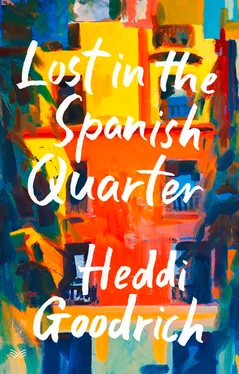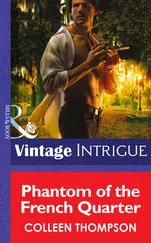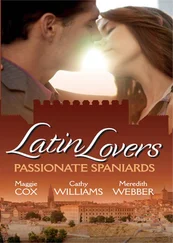When the sun began staining the port soda-pop orange, we looked into each other’s eyes again and there was a renewed awareness that we were two separate individuals. We started laughing, at nothing, perhaps with relief. I leaned against Pietro’s chest. There it was, the pendant I shouldn’t have seen when his shirt had opened up on the terrace, a smiling silver sun. I asked him if it had any special meaning to him.
“I bought it in a market, just a couple of months ago. And I thought while I was buying it that I wished I had someone to give it to. It’s pathetic, I know.”
“Not at all.” I held the sun in my hands. Around a grin of fulfillment were rays with tips almost too sharp to touch. “I find it moving.”
“You’re such a good person, Heddi,” he said rather solemnly.
“How did you learn my name?”
“I asked around. It wasn’t that hard.” Brushing the hair off my face, he added, “You’re beautiful too. But I bet you’ve heard that many times before.”
The truth was that, like all girls, I’d heard it plenty. When it came to the female form, at least in the slums a Neapolitan man wasn’t a man unless he vomited his private thoughts in the streets. But hearing it from Pietro was another thing altogether.
“I don’t know what you see in me,” he said. “I’m just from a small village. You’re a big-city girl.”
“A big city?” As if American cities were ranked by their verticality, I cut Washington down to size by telling him there were no skyscrapers, and that my dad and stepmom’s neighborhood was full of undocumented Mexican immigrants in cowboy hats, out of work and far from home, some who were so drunk by midday they couldn’t even stand up. I didn’t mention the Polish and Ugandan embassies just down the road: I didn’t want the capital of the United States to steal my thunder. But neither did I mention the other half of my life spent in the suburbs with my mom and stepdad.
Pietro’s particular dot on the map went by the name of Monte San Rocco. His parents were farmers, he told me, and poor—or at least they acted like they were. His mother hadn’t finished elementary school, and it was Pietro who’d taught his father to sign his own name. “Before that he used to sign with an x .”
“You mean he’s illiterate?”
Pietro turned toward the wall. “I don’t think you’d have given me another glance if you saw me on a tractor.” He turned back to me. “And yet, Heddi, I can’t help but want to be with you, from the first time I saw you.”
I hoped he couldn’t feel the drum of my heart against his chest. “Who knows? Maybe someday I’ll get to see you ride a tractor … or is it drive a tractor?”
“Fly a tractor.” He wiped his laughter away with a hand. As for me, the joke had not just saved me from a linguistic slipup but also broken the tension, and I burst out in heartfelt laughter. He said, “I’d sure like to fly to Washington someday.”
“I’d rather be here.”
“Really?”
“I love living by the sea.”
I laid my head on his chest. I hardly knew him but his smell was familiar even in its exoticness—a new spice, but one as earthy as salt, one I might no longer be able to do without. It came from his now crinkled shirt, his dusty hair, and his fading cologne that was now on my face too.
The slippery, molten sunlight cast sharp, geometrical shadows against the surrounding rooftops. The insidious sand of the scirocco really seemed to have gone. Maybe it wouldn’t be back again until next year.
I bolted upright. “I have to get back home.”
“Now?”
“It’s late. The boys will be worried.” But I wasn’t really thinking about the boys. I was thinking about Sonia.
From: heddi@yahoo.com
To: tectonic@tin.it
Sent: January 14
Dear Pietro,
How strange to be writing to you after all this time. How strange to be writing, period. I exchange letters with only a handful of people, I don’t have a diary. Sometimes I think I haven’t really made my peace with words and I’m more comfortable in the woods listening to the chirping of birds. Can you believe it, me in the woods? I like to immerse myself in their world and listen to all those unintelligible and at times haunting languages that overlap like verses sung in a round. It’s like being inside a beating heart …
Funnily enough, my job consists of words. I teach English to foreigners, mostly Chinese, Korean, and Russian immigrants. Learning is a game; we even go on field trips together and become quite close. Then they get into the university or find the job they were aiming for, etc., and I don’t see them again. I’m happy at least to have helped them make their dreams come true. I remember the dreams you had. Where have they gone?
It’s true, at times I do think about my own aborted dreams and it makes me suffer. But you shouldn’t beat yourself up, Pietro. It’s not your fault: blame destiny. Or rather, blame the lack of destiny and order in the world, blame chaos. I too have to accept responsibility for what happened. Besides, over the past few years I’ve come to realize something important: it’s possible to live without having any answers. You survive, life goes on. The world, with its tides and natural rhythms, is beautiful anyway, stunningly beautiful, even though (or maybe precisely because) it’s indifferent to our ups and downs and broken hearts.
I really would like it if one day you dropped by for a chat, but I think it’s unlikely. I’m not living in Washington, as you may believe, but in New Zealand. Maybe the constellations really are upside down here, on the other side of the world …
h.
6 Contents Cover Title Page LOST IN THE SPANISH QUARTER Heddi Goodrich Copyright Dedication Chapter 1 Chapter 2 Chapter 3 Chapter 4 Chapter 5 Chapter 6 Chapter 7 Chapter 8 Chapter 9 Chapter 10 Chapter 11 Chapter 12 Chapter 13 Chapter 14 Chapter 15 Chapter 16 Chapter 17 Chapter 18 Chapter 19 Chapter 20 Chapter 21 Chapter 22 Chapter 23 Chapter 24 Chapter 25 Chapter 26 Chapter 27 Chapter 28 Chapter 29 Chapter 30 Chapter 31 Chapter 32 Chapter 33 Acknowledgments A Note from the Translator and Author About the Author About the Publisher
THAT KISS, THAT KISS … Was this what tasting the forbidden fruit was like? Only one last moment of hesitation and then the immediate reward for throwing your better judgment to the wind: an explosion of god almighty on your tongue and a surge of the most perfect, unstoppable pleasure, so much so that you can’t distinguish the juice of the fruit trickling down your chin from the saliva from your own mouth, nor do you care.
I didn’t know much about Bible stories, but it did seem to me that there was something in that kiss that was so good it had to be against the law, maybe even against nature. And now that I’d tasted it, now that I knew , there was no going back. I couldn’t undo what I’d done, I couldn’t unknow what I now knew. And yet I didn’t even remotely want to go back. I was only shocked, incensed even. How had this been hidden from me my entire life?
I replayed that kiss over and over in my mind. Unlike with a cassette tape, there was no wearing or warping: the more I played it, the more it deepened in detail and emotion. By reliving it, I could slow it down and thus savor its many little components, some of which I’d very nearly missed the first time around: the salinity in the folds of his neck, his eyes, a tender yet vibrant shade of brown like a branch that has just shed its bark, his graceful yet broad hand spanning the back of my head as he pulled me in. That kiss was something that deserved to be relived, for I’d gone twenty-three years without it only to be granted half an hour.
Читать дальше












